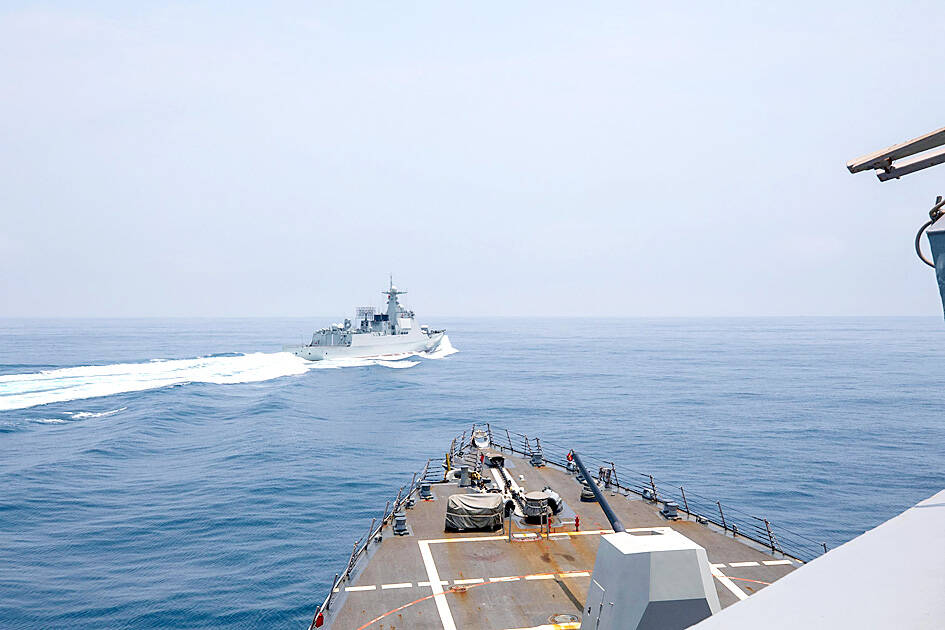A Taiwanese defense expert said he believes the best approach to counter China’s “gray zone” warfare tactics is for the US to ditch its long-held policy of “strategic ambiguity” in favor of “strategic clarity.”
In an article published online on Wednesday, Huang Chung-ting (黃宗鼎), an associate research fellow at the government-funded Institute for National Defense and Security Research, said that Washington has publicly blamed Beijing for two dangerous encounters between the two countries’ militaries over the past few weeks.
One was an incident between the US Navy and a Chinese warship in the Taiwan Strait last week. A video clip released on Sunday by the US appears to show a Chinese vessel crossing in front of a US destroyer, forcing it to slow down to avoid a collision.

Photo: Reuters / US Navy / Mass Communication Specialist 1st Class Andre Richard
Another incident at the end of last month involved a Chinese jet which the US accused of carrying out an “unnecessarily aggressive” maneuver near a US military plane in international airspace over the South China Sea.
Calling the two incidents “unacceptable,” US National Security Council spokesman John Kirby on Monday said that such “unsafe and unprofessional intercepts” could lead to “misunderstandings” and “miscalculations.”
In response, Chinese Ministry of Foreign Affairs spokesman Wang Wenbin (汪文斌) said that “the measures taken by the Chinese military are completely reasonable, legitimate, and professional and safe,” and accused the US of being the aggressor.
Huang said the two Sino-US skirmishes took place near Taiwan’s southeast air defense identification zone and in the Taiwan Strait, seriously jeopardizing Taiwan’s national security and US freedom of navigation.
Such incidents, together with a recent clash in the disputed South China Sea in which Manila accused Beijing of shining a “military grade” laser light at a Philippine coast guard boat, are part of Beijing’s “gray zone” warfare tactics deployed to test US responses to such aggressive behavior, Huang said.
Washington and Manila have a long-standing US-Philippines Mutual Defense Treaty, which dictates that both nations would support each other if either were to be attacked by a third party, Huang said.
However, the treaty does not give a clear definition of what constitutes an attack or whether shining a laser at the Philippine vessel is regarded as a form of attack, he said.
The lack of a clear definition of attack in the mutual defense treaty is one example of US adoption of “strategic ambiguity” to avoid angering China, he said.
To counter China’s “gray zone” warfare, Huang said the US should ditch such ambiguity and make clear what kind of military response it would take should China continue to use similar tactics against the US and other countries.
“Gray zone” tactics are generally defined as coercive actions that do not meet the threshold of conventional warfare.

An essay competition jointly organized by a local writing society and a publisher affiliated with the Chinese Communist Party (CCP) might have contravened the Act Governing Relations Between the People of the Taiwan Area and the Mainland Area (臺灣地區與大陸地區人民關係條例), the Mainland Affairs Council (MAC) said on Thursday. “In this case, the partner organization is clearly an agency under the CCP’s Fujian Provincial Committee,” MAC Deputy Minister and spokesperson Liang Wen-chieh (梁文傑) said at a news briefing in Taipei. “It also involves bringing Taiwanese students to China with all-expenses-paid arrangements to attend award ceremonies and camps,” Liang said. Those two “characteristics” are typically sufficient

A magnitude 5.9 earthquake that struck about 33km off the coast of Hualien City was the "main shock" in a series of quakes in the area, with aftershocks expected over the next three days, the Central Weather Administration (CWA) said yesterday. Prior to the magnitude 5.9 quake shaking most of Taiwan at 6:53pm yesterday, six other earthquakes stronger than a magnitude of 4, starting with a magnitude 5.5 quake at 6:09pm, occurred in the area. CWA Seismological Center Director Wu Chien-fu (吳健富) confirmed that the quakes were all part of the same series and that the magnitude 5.5 temblor was

The brilliant blue waters, thick foliage and bucolic atmosphere on this seemingly idyllic archipelago deep in the Pacific Ocean belie the key role it now plays in a titanic geopolitical struggle. Palau is again on the front line as China, and the US and its allies prepare their forces in an intensifying contest for control over the Asia-Pacific region. The democratic nation of just 17,000 people hosts US-controlled airstrips and soon-to-be-completed radar installations that the US military describes as “critical” to monitoring vast swathes of water and airspace. It is also a key piece of the second island chain, a string of

The Central Weather Administration has issued a heat alert for southeastern Taiwan, warning of temperatures as high as 36°C today, while alerting some coastal areas of strong winds later in the day. Kaohsiung’s Neimen District (內門) and Pingtung County’s Neipu Township (內埔) are under an orange heat alert, which warns of temperatures as high as 36°C for three consecutive days, the CWA said, citing southwest winds. The heat would also extend to Tainan’s Nansi (楠西) and Yujing (玉井) districts, as well as Pingtung’s Gaoshu (高樹), Yanpu (鹽埔) and Majia (瑪家) townships, it said, forecasting highs of up to 36°C in those areas